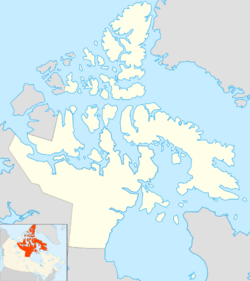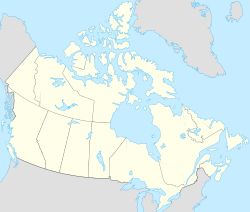Dundas Island (Nunavut) facts for kids
| Geography | |
|---|---|
| Location | Northern Canada |
| Coordinates | 76°05′N 95°00′W / 76.083°N 95.000°W |
| Archipelago | Queen Elizabeth Islands Canadian Arctic Archipelago |
| Area | 51 km2 (20 sq mi) |
| Administration | |
|
Canada
|
|
| Territory | Nunavut |
| Demographics | |
| Population | Uninhabited |
Dundas Island is a cool, uninhabited island way up north in Canada! It's part of a group of islands called the Queen Elizabeth Islands and the larger Canadian Arctic Archipelago. You can find it in Nunavut, which is one of Canada's territories. This island has a unique, irregular shape and sits between two other islands: Devon Island and Baillie-Hamilton Island. A smaller island, Margaret Island, is just 1 kilometre (about half a mile) to its east.
Contents
Naming Dundas Island
Dundas Island got its name from an important person in history. It was named after Henry Dundas, 1st Viscount Melville. He was a British Secretary of State for the Home Department. This means he was a high-ranking government official in Britain.
Exploring for Minerals
In 1972, people found signs of valuable minerals on Dundas Island. This led to more exploration the next year. Scientists started taking samples of the ground and making maps. They were looking for places where minerals might be hidden.
Mining Company Interest
A Canadian mining company called Cominco became interested in the island. Today, Cominco is part of a bigger company called Teck Resources. In 1974, Cominco claimed parts of the island. They wanted to explore for minerals there.
Drilling for Lead and Zinc
In 1975, Cominco started drilling into the ground. They found areas with high amounts of lead and zinc. These valuable metals were found in specific rock layers. These layers are known as the Thumb Mountain Formation and Disappointment Bay Formation. In 1981, Cominco continued their work. They used special surveys to look deeper underground.
Ancient History of the Island
Dundas Island has a long history, even before modern explorers arrived. In 1981, a researcher named Robert John McGhee studied the island. He found signs that people lived there a very long time ago.
Evidence of Dorset Culture
McGhee's research showed evidence of the Dorset culture. This was an ancient group of people who lived in the Arctic. They used Dundas Island as a place to stay during the warmer months. They built special homes for these warm-season visits.
Another Dundas Island
It can be a bit confusing, but there's actually another Dundas Island in Nunavut! This second island is much smaller. It's only about 500 metres (about 1,640 feet) long. You can find it off the Boothia Peninsula, in an area called St. Roch Basin. It's located across from King William Island.
 | George Robert Carruthers |
 | Patricia Bath |
 | Jan Ernst Matzeliger |
 | Alexander Miles |



